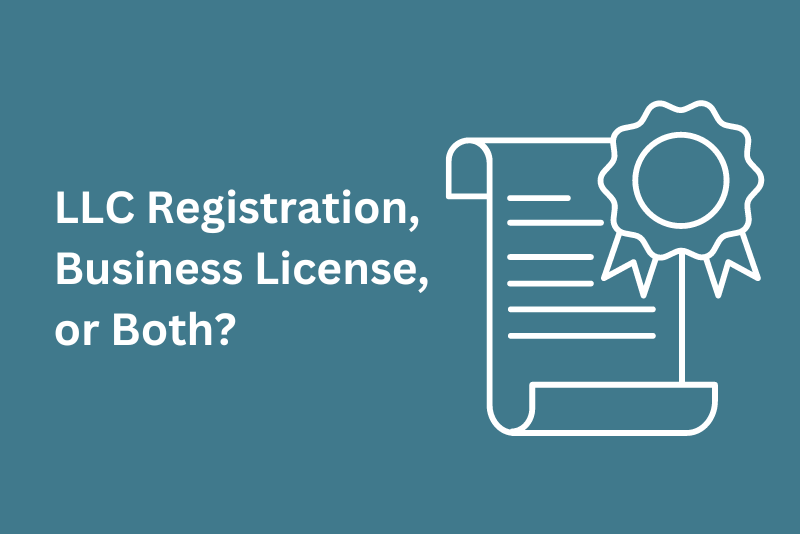Many entrepreneurs assume that after going through all the steps of setting up and filing a Limited Liability Company (LLC) with the state, they’re free to begin doing business. While that assumption is understandable, it’s not correct.
Before you can hang out your shingle and begin interacting with customers, you’ll need to obtain the business licenses you need to operate legally. You could need one or more business licenses at the federal, state, or local level—or possibly from two or even all those jurisdictions.
A big part of owning and managing a business is being attentive to matters such as licenses, taxes, and insurance. These tasks that aren’t fun to think about or carry out, but necessary if your business is to operate in compliance with regulations.
So even if you’ve set up and registered an LLC, it’s important to know a business license or permit may be required. While you don’t need a business license to start an LLC, nearly every business, including LLCs, is required to have a business license.
What is an LLC and How Can I Start One?
An LLC is a type of business entity that’s widely employed by entrepreneurs. It’s a separate legal entity from its owner or owners, which normally protects members’ personal assets, such as bank accounts, homes, and vehicles, if the LLC is sued or can’t pay its debts. The business can be held liable, but the personal liability protection afforded by the LLC means its owners typically are not.
There are different types of LLCs:
- You can have a single-member LLC with one member and a multi-member LLC with two or more members.
- An LLC can be member-managed, which means the people who own it are also in charge of the day-to-day operations, or manager-managed, which means the business is managed by a non-member.
- An LLC that was created, is registered, and does business in the same state is called a domestic LLC, while one that is registered in one state and doing business in another is considered a foreign LLC.
- There is also a Professional Limited Liability Company (PLLC), which is primarily used for businesses that have licensed professionals such as lawyers, doctors, or architects.
- Then there is a Series LLC, which is popular among real estate investors and others who operate multiple lines of business.
- Finally, there is a Low-Profit LLC (L3C), which is a business that’s often created for charitable reasons.
While a single-member LLC is by default taxed as a Sole Proprietorship and a multi-member LLC as a Partnership, an LLC can elect to be taxed as a Corporation. There are pros and cons of both methods of taxation, and you should do your research and consider carefully before deciding which method to choose.
The basic steps to register an LLC:
- To start an LLC, you’ll need to file Articles of Organization with the state where the business will be registered. Articles of Organization is a public document containing information relevant to the business, such as its name, purpose, address, the name of its registered agent, explanation of management structure, and the duration of operations.
- The Articles of Organization must be signed and submitted to the office of the Secretary of State or corresponding office.
- You also should formulate an Operating Agreement for your LLC, regardless of the type of business you operate or how many members the LLC has. An Operating Agreement, while not legally required in most states, is important because it spells out how the business will operate, outlines rules for governance procedures, states how the business will be taxed, and provides other guidelines for the business and its members.
Starting an LLC is not overly difficult, but you’ll need to be sure to comply with all state regulations regarding naming your LLC, choosing how it will be taxed, getting an employer identification number, and other rules.
Register Your LLC With CorpNet
Forming a Limited Liability Company doesn’t have to be hard. Let us help and we’ll handle all the paperwork for you.
What is a Business License and Do You Need One?
A business license is permission from an authority to operate your business within a specific place, such as a state, county, or city. Business licenses work to control the types of businesses that operate in certain locations with the intent of keeping residents safe and regulating the use of land. They also show customers that a business meets all regulations and is acting in compliance with applicable laws.
There are hundreds of different types of business licenses or permits, ranging from swimming pool licenses to development permits to nursery plant dealer licenses to vending machine and device permits.
Federal Licenses
LLCs, as you know, are governed by the state in which they’re registered, and not recognized at the federal level. Even so, LLCs with certain types of business operations are regulated by federal agencies and require a federal license or permit. If your LLC does business in any of the areas listed below, you’re most likely required to obtain a permit or license from a federal agency.
Some examples of federal business licenses:
- Agriculture – If your LLC is in the business of transporting animals, animal products, biologics, or plants across state lines, you’ll need a license from the Department of Agriculture. That also applies to businesses that import any of those items.
- Alcoholic Beverages – Companies that manufacture alcoholic beverages, wholesale them, or sell them in a retail location must obtain a license from the Alcohol and Tobacco Tax and Trade Bureau. You’ll also need a license from your local alcohol control board.
- Aviation – If your business operates or maintains aircraft or transports people or goods by air, you’ll have to get a license from the Federal Aviation Administration.
- Firearms, Ammunition, and Explosives – Businesses that manufacture, import, transport, or deal in firearms, ammunition, or explosives—in some cases including fireworks—must have a license from the Bureau of Alcohol, Tobacco, Firearms, and Explosives.
- Fish and Wildlife – If your business imports or exports animals or engages in any activity related to wildlife, you’ll need a license from the U.S. Fish and Wildlife Service.
- Commercial Fisheries – A license from the National Oceanic and Atmospheric Administration Fisheries Service is required for businesses that engage in commercial fishing.
- Maritime Transportation – If your LLC provides ocean transportation or ships cargo by sea, you must get a license from the Federal Maritime Commission.
- Mining and Drilling – Businesses that are involved in mining or drilling for natural gas, oil, or other resources are required to obtain a license from the Bureau of Safety and Environmental Enforcement.
- Nuclear Energy – The U.S. Nuclear Regulatory Commission requires licenses for companies that produce commercial nuclear energy, operate a fuel cycle facility, or distribute or dispose of nuclear materials.
- Radio and TV Broadcasting – If your LLC broadcasts information by television, radio, satellite, cable, or wire, you’ll need a license from the Federal Communications Commission.
- Transportation and Logistics – If your business operates oversized or overweight vehicles, you’ll need a state permit to do so. It’s advised that you contact the U.S. Department of Transportation, which will direct you to the state office that will issue the permit.
State Licenses
While most LLCs will not require a federal license, it’s likely that your company will need licenses and/or permits from the state where you operate.
Most states do not require a general business license, but the following states mandate that every business have one:
- Alabama
- Alaska
- Delaware
- Nevada
- Washington
- Washington DC
Even if your LLC operates in a state without a general business license, there are likely other types of state-imposed licenses that you’ll need.
If your LLC sells goods or services and your state requires you to collect sales tax, you’ll probably need to obtain a sales tax license.
Other states require occupational licenses or professional licenses for businesses such as:
- Physicians
- Accountants
- Appraisers
- Barbers
- Cosmetologists
- Insurance agents
- Plumbers
- Electricians
- Childcare providers
- Auctioneers
- Mechanics
- Private investigators
Additionally, you could need a state seller’s license if your business sells alcohol, lottery tickets, gasoline, firearms, or other goods that are regulated by the state. You can find out what types of state licenses your business might need and how to apply by contacting the Secretary of State or corresponding office.
You’ll need a taxpayer identification number and an employer identification number to apply for a state business license. You may be asked to provide some basic information about your LLC, such as what products you’ll be selling or the exact location of the business. You’ll need to pay a fee for a state license and will probably have to pay to renew it each year.
Local Licenses and Permits
If for some reason you’re able to avoid having to obtain a state license, you’re probably still not off the hook, as most counties, cities, and other municipalities require some sort of license or permit for businesses.
Most municipalities, including counties and cities, require LLCs to obtain a general business license to operate there. That license normally serves as a tax registration that grants legal approval to conduct business. In addition to that license, you’ll need a zoning or building permit if you’re building a new structure or making extensive renovations to an existing building. You might also need a permit to use an existing building for an activity that’s different from what was there previously, or if you operate a business from your home.
A business such as a nail salon or barber shop is likely to be required to get a local health permit, as are restaurants, bakeries, and coffee shops. You could need a license or permit to hang a sign outside your business, or an environmental permit if your business involves certain undertakings such as burning materials.
Which licenses and permits you’ll need from your county or city vary tremendously depending on where you’re located and what your business is and are subject to change. Be sure to check with local authorities to find out exactly what you’ll need to operate legally.
Business License Research Services
CorpNet can research your business and location to make sure you know exactly what permits and licenses you need. We’ll also provide the forms your need to file.
Consequences of Operating Without a Business License
The consequences of operating without required licenses and permits can be severe, ranging from reputation damage to business closure.
It’s certainly not unheard of for a government agency to shut down a business that fails to comply with licensing requirements, especially if the agency has notified that business that it’s not in compliance.
Fines and fees are another potential penalty for operating without a license, sometimes imposed on a daily basis until the business is in compliance. If you’re unable to pay the fines, a government agency could charge you interest or impose a lien on your property. The amount of fines you’d pay depends on what industry your business is in, where it’s located, and other factors. You could also face a fine if you let your license expire while continuing to operate.
Operating without a business license opens the door to legal action by customers, creditors, government agencies, and vendors, who could file a lawsuit citing lack of a business license as a fraudulent activity. This, of course, could result in financial consequences as well as damage to your LLC’s reputation.
Protect Your Business
Regardless of the business entity you choose, you’ll need to deal with business licenses of various sorts and at different levels of government.
It can be difficult to be sure you have all the licenses and permits that are required. There are an astounding number of licenses available, and understanding which apply to your particular circumstances can be confusing. Depending on the type of business you have, the industry you fall under, the products or services you provide, and your location, you could need licenses from federal, state, and local governments.
If you’re feeling overwhelmed by the process of researching to determine which licenses and permits you need and filling out and filing forms with various agencies, CorpNet can do that for you, leaving you to work on running and growing your business.





